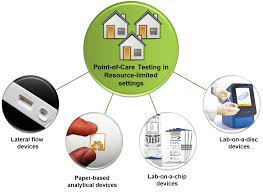Point-of-Care Diagnostics for Infectious Diseases Training course
Point-of-Care Diagnostics for Infectious Diseases Training course is designed for healthcare professionals, laboratory technicians, and public health workers interested in the latest advancements in diagnostic technologies.

Course Overview
Point-of-Care Diagnostics for Infectious Diseases Training course
Point-of-Care Diagnostics for Infectious Diseases Training course is designed for healthcare professionals, laboratory technicians, and public health workers interested in the latest advancements in diagnostic technologies. This course focuses on the principles, applications, and implementation of point-of-care (POC) diagnostics in the rapid detection and management of infectious diseases.
Point-of-care diagnostics play a crucial role in enhancing disease management, particularly in resource-limited settings. Participants will learn about various POC testing methods, their advantages and limitations, and how to effectively integrate them into clinical practice. Through interactive workshops, case studies, and hands-on exercises, attendees will gain practical experience in using POC diagnostic tools.
Course Objectives
- Understand the principles and importance of point-of-care diagnostics.
- Identify key infectious diseases suited for POC testing.
- Analyze the advantages and limitations of POC diagnostic methods.
- Develop skills to select and implement appropriate POC tests.
- Engage stakeholders in discussions about POC diagnostic technologies.
- Explore case studies of successful POC diagnostic implementations.
- Advocate for policies supporting the use of POC diagnostics in healthcare.
- Prepare for challenges in the integration of POC diagnostics.
- Utilize data to inform decisions regarding POC testing.
- Assess the impact of POC diagnostics on health outcomes.
- Design training programs for healthcare providers on POC testing.
- Evaluate the quality control measures necessary for POC diagnostics.
- Foster innovation in POC diagnostic technologies to address emerging infectious diseases.
Target Audience
- Healthcare professionals
- Laboratory technicians
- Public health workers
- Medical students
- Epidemiologists
- Policy makers
- Community health workers
- Researchers
Course Duration: 5 Days
Course Modules
Module 1: Introduction to Point-of-Care Diagnostics
- Overview of POC diagnostics and their role in infectious disease management.
- Historical context and evolution of diagnostic technologies.
- Key terms and definitions related to POC testing.
- Current trends and challenges in POC diagnostics.
- The impact of POC diagnostics on healthcare delivery.
Module 2: Types of Point-of-Care Diagnostic Tests
- Understanding different types of POC tests (e.g., rapid antigen tests, molecular tests).
- Analyzing the mechanisms of various diagnostic technologies.
- Evaluating the sensitivity and specificity of POC tests.
- Case studies of POC tests for diseases such as HIV, malaria, and tuberculosis.
- Hands-on demonstrations of POC diagnostic tools.
Module 3: Implementation of POC Diagnostics
- Developing a strategy for implementing POC testing in clinical settings.
- Identifying the key stakeholders and their roles.
- Addressing logistical challenges in POC diagnostic implementation.
- Training healthcare staff on POC testing procedures.
- Case studies on successful implementation of POC testing programs.
Module 4: Quality Assurance and Control
- Understanding quality assurance processes for POC diagnostics.
- Developing protocols for maintaining the accuracy of tests.
- Addressing common challenges related to POC test reliability.
- Evaluating the performance of POC diagnostic tools.
- Case studies on quality control in POC testing.
Module 5: Engagement and Communication
- The importance of stakeholder engagement in POC diagnostics.
- Strategies for communicating the benefits of POC testing to communities.
- Building partnerships with local health authorities and organizations.
- Engaging patients in understanding their diagnostic options.
- Evaluating communication efforts related to POC diagnostics.
Module 6: Policy Advocacy for POC Diagnostics
- Understanding the policy landscape for POC diagnostics.
- Strategies for advocating for the integration of POC testing in health systems.
- Engaging policymakers in discussions about diagnostic accessibility.
- Case studies of successful advocacy for POC diagnostics.
- Evaluating the impact of policies on POC testing implementation.
Module 7: Future Directions in POC Diagnostics
- Emerging trends and innovations in POC testing technologies.
- The role of telemedicine and digital health in POC diagnostics.
- Preparing for future challenges in diagnostic testing.
- Global perspectives on the use of POC diagnostics.
- Building resilient health systems that incorporate POC technologies.
Module 8: Data Utilization in POC Diagnostics
- Utilizing data to inform decisions regarding POC testing.
- Analyzing trends and patterns in diagnostic data.
- Integrating POC diagnostic data into health information systems.
- Case studies on data-driven approaches to POC diagnostics.
- Future trends in data utilization for improving health outcomes.
Training Methodology
- Interactive Workshops: Facilitated discussions, group exercises, and problem-solving activities.
- Hands-On Demonstrations: Practical experience with POC diagnostic tools and techniques.
- Case Studies: Real-world examples to illustrate successful POC implementations.
- Expert Presentations: Insights from experienced professionals in diagnostics and public health.
- Group Projects: Collaborative development of POC testing strategies.
- Action Planning: Development of personalized action plans for implementing POC diagnostics.
- Digital Tools and Resources: Utilization of online platforms for collaboration and learning.
- Peer-to-Peer Learning: Sharing experiences and insights on POC diagnostics.
- Post-Training Support: Access to online forums, mentorship, and continued learning resources.
Register as a group from 3 participants for a Discount
Send us an email: info@datastatresearch.org or call +254724527104
Certification
Upon successful completion of this training, participants will be issued with a globally recognized certificate.
Tailor-Made Course
We also offer tailor-made courses based on your needs.
Key Notes
- Participants must be conversant in English.
- Upon completion of training, participants will receive an Authorized Training Certificate.
- The course duration is flexible and can be modified to fit any number of days.
- Course fee includes facilitation, training materials, 2 coffee breaks, buffet lunch, and a Certificate upon successful completion.
- One-year post-training support, consultation, and coaching provided after the course.
- Payment should be made at least a week before the training commencement to DATASTAT CONSULTANCY LTD account, as indicated in the invoice, to enable better preparation.